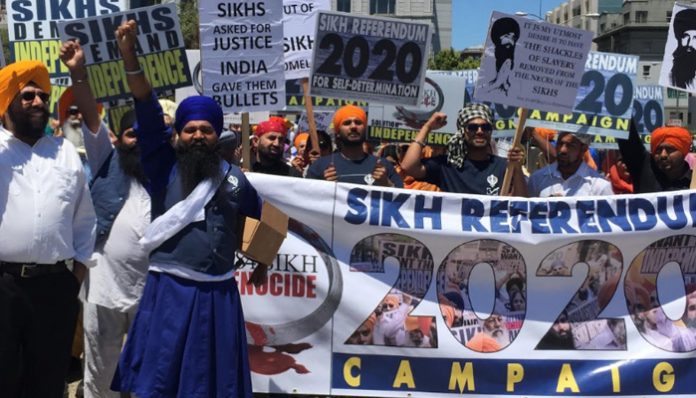LONDON: The British government has rejected the demand of the Indian government seeking a ban on a pro-Khalistan group planning to issue a “London Declaration” for a “referendum” on Punjab’s independence from India at Trafalgar Square on August 12.
The US-based group called Sikhs for Justice is preparing for the event in Trafalgar Square and its understood the group has the support of many Sikh groups in the UK. Sikhs for Justice held a press conference in Southall, London, and announced its plans of “referendum” with the pledge that it will continue to highlight the case of a separate Sikh homeland.
The Sunday Times reported that the event next Sunday in Trafalgar Square has caused a diplomatic rift between the British and Indian governments, with India lodging a formal protest with the Foreign and Commonwealth Office (FCO).
Indian government wrote to the British government that a minority of Sikh hardliners are exploiting free-speech laws in Britain to call for the creation of a separatist state known as “Khalistan”.
The paper reported that the rally is being funded by Sikhs for Justice and that one of the key figures linked with the event is a Birmingham-based activist, Paramjeet Singh Pamma, wanted in India for his alleged involvement in bombings in 2010 and for the killing the previous year of Rulda Singh, a political leader who worked for the Hindu nationalist cause.
Pamma, who came to Britain in 2000, denies the “false charges” and said the British police investigated him in 2010-11 which resulted in no action against him and an attempt by the Indian authorities to extradite Pamma from Portugal — where he was arrested on holiday in 2015 — ended in failure.
When asked about the Indian government’s request to ban the rally, a spokesman of the FCO said that in the UK, people have the right to gather together and to demonstrate their views, provided that they do so within the law.
The spokesman said that actions will be taken if laws of free speech are violated or disorder or violence is encouraged in Britain.
Its understood that the British government had requested the British government to deny permission for the event. Sikhs for Justice hopes that around 10,000 Sikhs will be attending the event in London from all over the UK.
Pamma said the rally is intended to raise awareness for a non-binding referendum in 2020, calling for the Sikh-majority state of Punjab to be granted independence. Organisers are hoping a high turnout will put pressure on the United Nations to ask India to hold a plebiscite, said the Sunday Times.
“On August 12, we will unveil the case for Sikhs’ right to self-determination as guaranteed in the UN Charter and International Covenant on Civil and Political Rights,’’ said SFJ’s legal advisor, attorney Gurpatwant Singh Pannun.
“It is the principle of the right to self-determination and the common occupying power – India – that brings Sikh and Kashmiri people on a joint platform in their democratic quest for freedom of their homelands.”
The Sikh Federation (UK) told this correspondent in a statement said that Indian reaction to the event in London on Khalistan was unnecessary.
“As usual the Indian authorities are overreacting to the Sikh Diaspora and resorting to misinformation. Since 1966 the Indian state in accepting the right to self-determination at the UN imposed an unacceptable ‘reservation’ that it could not apply to the people of India. No doubt fearing a break up of the country with a number of legitimate secessionist movements.
“The right of self-determination is a basic human right and absolutely fundamental to the protection of individual rights. The vast majority if not all UK politicians support this right based on international law.”
The Sikh Federation added: “In our view the reestablishment of a Sikh homeland is inevitable with the Sikh Diaspora leading the way and gaining the direct support of world powers like the USA and China with a vested interest and countries like the UK, Germany, Canada and Australia to name a few, also playing their part.
Metropolitan police said it was aware of the march in London and “an appropriate and proportionate policing plan is in place”.





